with supply and demand and all… IM DEMANDING CANNED BREAD!! where’s the supply 🥺?
It replaces workers with robots so it would probably save money too.
People in the US don’t respect others property. Look at any atm machine or vending machine. There’s no way these things wouldn’t be vandalized immediately.
This is the answer. Japan has a lot of respect for others (well, for other japanese at least), so these types of machines will last a lot longer; making the payoff more palatable.
Place a vending machine outside in America, and it’ll be vandalized in a week max.
Even in highly walkable cities, you don’t see vending machines. It has nothing to do with cars, it has to do with the culture of the US being one of disrespect most of the time.
Vandalize? … the entire machine would be stolen. Either by thieves wanting to steal the merchandise or money or both. Or a bunch of teens that would tie a chain to it and drag it to the end of town for fun.
Vending machines in the USA are common, but they are typically attached to an existing business. For instance, a Walmart or gas station will commonly host several machines in its entrance area.
Completely this. Americans don’t like letting other people have nice things. A vending machine would be vandalized, filled with glue as a TikTok prank, attempted to be stolen, and stop working within a few days.
Americans don’t really give a shit about other people. We’re more individualistic. You got yours? Good. Fuck everyone else. If we have to have protests and fundraising efforts to TRY to convince people to help others – we got a long way to go.
Japan is built on respect for your fellow man. You can leave your wallet out somewhere and someone would return it immediately.
Respect for your fellow Japanese man. They have a long way to go in the xenophobia angle.
Americans often don’t respect other Americans, NOR other countries. We also know xenophobia/racism well.
Respect for others property might follow respect for others but that’s not a popular concept in America
When I visited california, there was a mall with multiple vending machines like the one in the OP for various foods and icecreams.
Bet it was inside the mall, with a camera watching it. Japanese vending machines like the one mentioned can be just outside nbd.
They were in the hallways, not out on the street. I didn’t look for any cameras, but there wasn’t any security nearby that would’ve seen anyone vandalize them. If there were cameras, I can’t imagine it mean much to people wearing a mask.
I’m not saying vandalism isn’t more common in the US, I’m sure it is in compared to hyper-respectful Japan, but I don’t think it’s absolutely impossible to have these.
Growing up in the south eastern US vending machines were a common sight in a number of public spaces, and they were completely fine. No idea what third-world parts of the country the rest of these people grew up in.
Southeasterner here. That’s changed.
It’s a shame too because automats used to be a great way for urban poor to get low cost food. I know a vending machine isn’t the same as an automat but they are similar and would be treated similarly.
Too much reliance on cars for transportation and commerce built around that. Compared to Japan; we don’t have the opportunity for vending machines except when we are contained to a location without the ability to go to a store that isn’t that “far”. We have a larger scale of living; a half hour drive is normal to us, but a half hour drive for other countries is at the tipping point of finding a place to stay for the night and a vending machine selling a common foodstuff makes sense.
If you were forced to walk everywhere and “corner stores” were infrequent, vending machines would be far more common and worthwhile for owners of those machines.
I’m with you until the last paragraph. Corner stores are all over the place in Japan. It’s fantastic.
That is most likely the right answer.
I’m in Switzerland and we have vending machines (not as cool as the Japanese ones tho) because we walk past them everyday.
They are generally on the pavement near post offices, at train stations and other large public transportation places. For a time there was cigarettes vending machines near bars but I think those are now forbidden.
TBF I also felt Swiss people are much more trustworthy than most.
I even remember having going out for dinner and the person behind the counter asking what we ordered; seems like a lot of restaurant ordering systems don’t keep track of orders because you can trust people being honest when they re-state their order at the counter.
I’m from the Netherlands, also in a very walkable city (Utrecht), and students would vandalise vending machines if they existed!
Trust and respect are some of the core principles in Swiss education and society. There are those well known newspapers stands that always amaze tourists. They are not locked nor monitored but people still pay for the newspaper.
For the restaurants it can be true but most places will know what you had only because the cash register system works like that (like they take the order on a phone that automatically sends everything to the kitchen and till). It’s mostly because all the systems available on the market works like that.
But as everywhere, things are changing for the worse, there’s more and more violence, disrespect etc.
Fun fact, I once had French friends visiting and they saw a field where you can take fruits yourself, weight them and pay the according price. No human supervision, no cameras. They were amazed and told me “In France we wouldn’t pay for the fruits, steal the money box AND the weighting machine”
Hm, actually now I do remember countryside Netherlands (achterhoek, to be more exact) has (had?) farmers selling their potatoes, strawberries or other produce just by putting them all on a big table next to a road, and putting a sign saying how much they cost with a little plastic container to put your cash in.
Also no human supervision, whatsoever.Though I haven’t seen them as much anymore, and quite some seem to have been replaced by vending machines or disappeared completely…
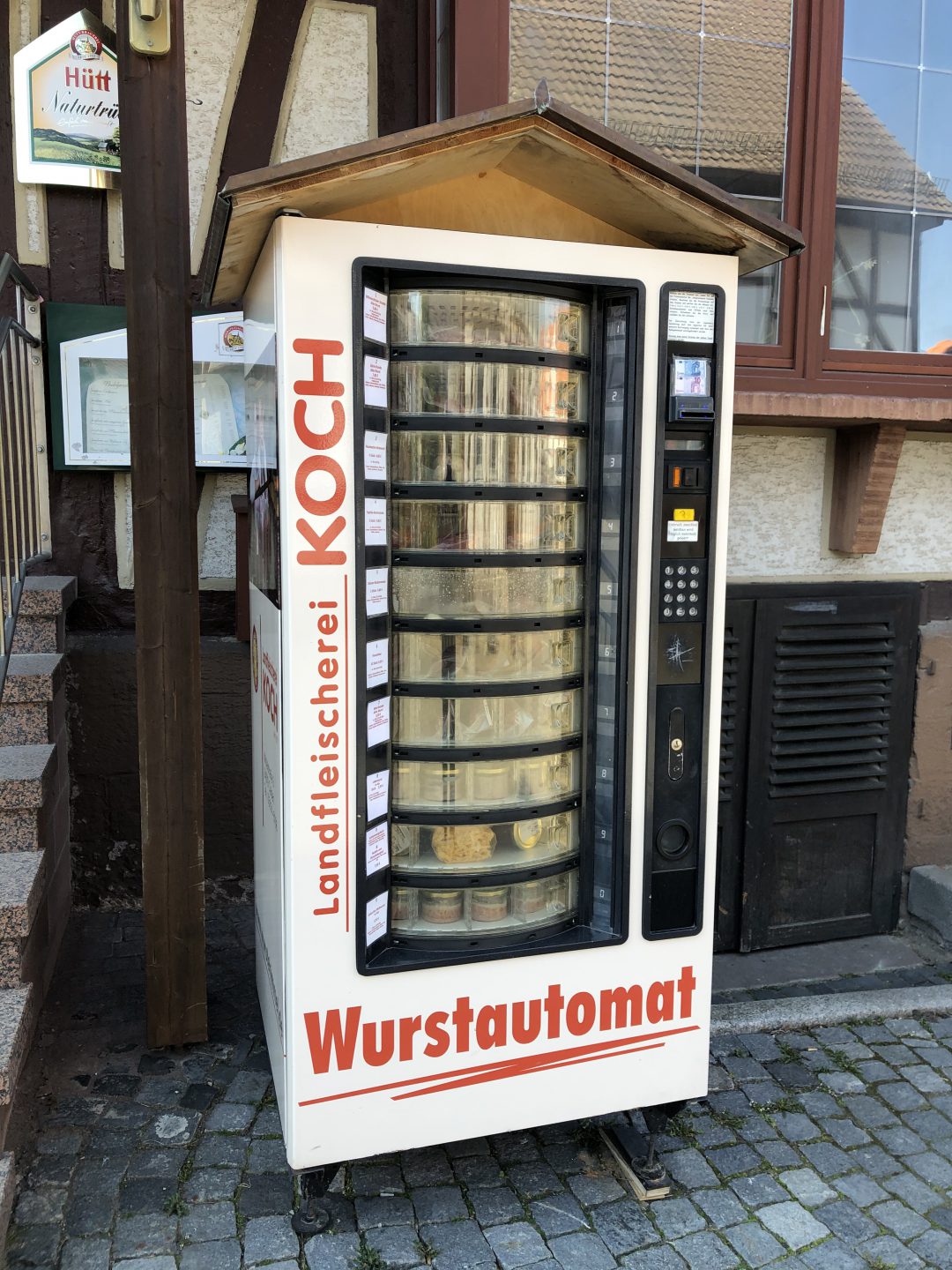
lol, I only know the selecta ones but I’ll try the wurstaumat next time I’m in the german part of the ruesti.
Bro, do you even vend?
Pizza vending machine in Seattle:
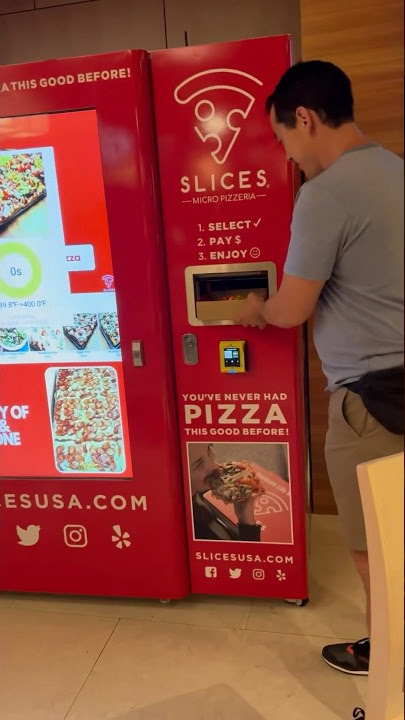
Cupcake ATM in Beverly Hills (and 3 other cities I’ve been in including Orlando FL and Las Vegas):
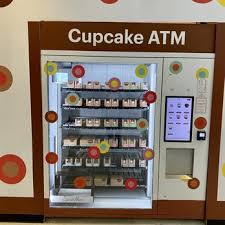
Oh that’s rad! Wonder if the amount of public areas in cities could relate to have more vending machines. The closest city to me doesn’t have a lot of public spaces.
I would imagine the requirement would be high foot traffic. Food has an incredibly short shelf life compared to other vending machine contents. That pizza vending machine likely has to be serviced/refilled/cycled every 2 or 3 days. The cupcake ATM would be slightly longer. Most of the cupcake ATMs are attached to the cupcake bakeries, but allow customers to buy from the ATM outside of business hours or when the line of customer is really long inside.
The pizza vending machine is in a hotel a block away from a larger physical location by for the same company. So similar arrangement. Probably easy for them to maintain
Probably easy for them to maintain
Agreed. I made the maintenance comment as to why pizza vending machines aren’t more widespread.
This is at the Hyatt, ain’t it?
What’s the wait time for the pizza to bake?
About 4 min. There’s a countdown on the screen after you pay and your order is being prepared.
In the USA they lack the population density pressure to make it the most optimal solution of serving food, and the startup costs don’t justify changing from human labor to fully automated food sales. Also I bet the quality isn’t as good as you think it is from some preserved fried food wrapped in plastic.
Japan loves wrapping everything in plastic. They and the US were the only ones not to sign a promise reduce plastic usage. For all the appearances of Japan being eco conscious, they have this one big issue.
And whales.
Whale meat isn’t even that popular. Boomers just like it and like “pissing off the libs”. Younger generations don’t like it.
Your first sentence hit the nail on the head. Most Americans travel nearly exclusively in their car. Why would they get out of their car to use a vending machine when McDonald’s has a drive-thru? Or if they are willing to get out, why wouldn’t they just pick up fresher food from a restaurant? Moreover, mobile ordering has solved the issue of having to talk to people.
The US does have some vending machines like this, but pretty much exclusively in areas with very high foot traffic, like airports, train stations in major cities, etc.
Is that really what’s happening in the picture OP posted? Like someone puts foil wrapped morsels of… food in there once a week and the machine just keeps a couple hot and ready to go?
Seems very unappealing.
That said here in Australia the food you get at gas stations / road houses is more or less the same, just that there’s a person to heat it up and hand it to you.
deleted by creator
deleted by creator
I’m in France. There is a gas station near me with three vending machines : drinks, pizzas, and CBD.
The pizza one is mostly fine. The grid protecting the screen was torn apart. Tbf it was annoying. The drinks one is damaged, and is now protected by a metal cage. The CBD machine is completely destroyed.
All publicly available objects in France end up like this.
I thought you were going to say that their culture is more insular and less sociable, because that would be a better explanation than the popularity of vending machines.
Factories I’ve worked at had vending machines filled with microwavable food (burritos, burgers, sandwiches, etc). All of it was pretty disgusting.
Exactly.
My thought when opening the post was basically, “Can you imagine the depths that American corporations would sink to in a market where they can totally conceal the flavor, size, quality, etc. of their products until after the sale, and not have anyone from the company present, making them totally immune to any negative feedback?”
Presumably the companies behind these things in Japan are at least delivering a somewhat acceptable food item. I wouldn’t be surprised in any way to find an American version of this thing dispensing literal dead rats.
My experience here. Had one a place I worked which did breakfast foods (yogurt, breakfast sandwiches, breakfast burritos , etc) with a small microwave slot to heat up after it vended. Food was absolutely gross and it was always dicey if anything it vended was still in date. Only nice thing was the front was see through so you could check which items had visible mold and avoid those…
Was cheaper than the cafe and had better hours (all of them) for my shift, but I don’t think the trade off of rolling the dice on food poisoning was worth it lol.
Reminds me of when I had a summer job in a Steel Mill. Two hotdogs for a dollar from a vending machine (AVI). I’d eat that almost every day.
Wash it down with some SQUINCHER
Squincher, that takes me back for sure.
Vending machines work better when there’s more foot traffic and more density.
Vending machines with specialty goods (as pictured) need to be restocked every day and they require even more foot traffic. I think this is the biggest factor why OP’s vending machine is not viable in a lot of places in the US.
I’d argue places like Sheetz serve a similar function in the US
We do have lots of places like Sheetz that serve a similar function, but to be entirely automated is rare.
Automats might be a closer analog.
In the Netherlands Food Automats are still very popular
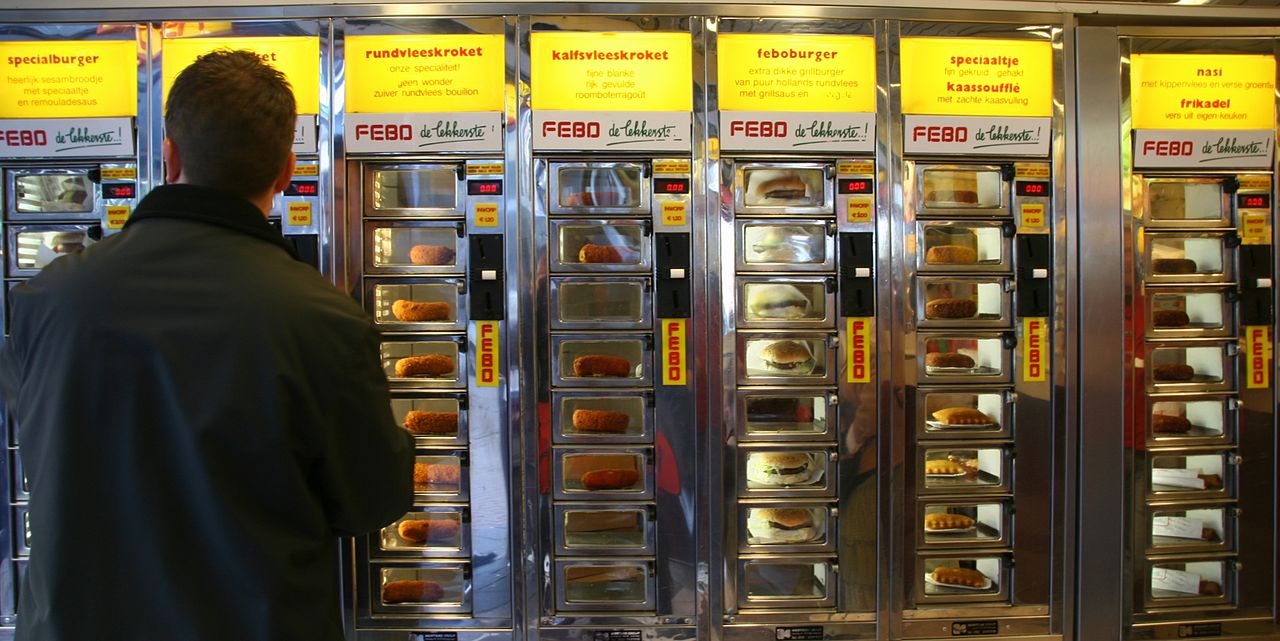
Looks cool! How is the quality?
Wow. Those words are so wild that my mind just defaulted to thinking the image was AI generated.
I sure can’t wait to get my hands on a speciaaltje kassouffle.
In France they have this:

We have this:
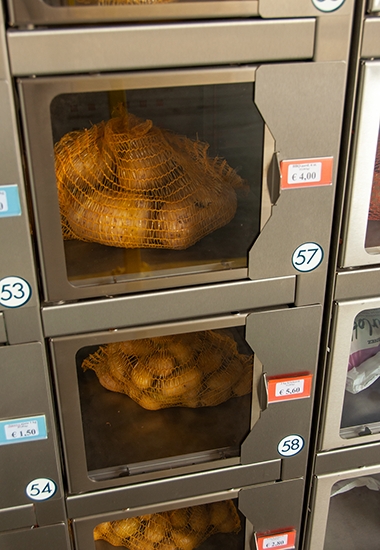 and this:
and this:
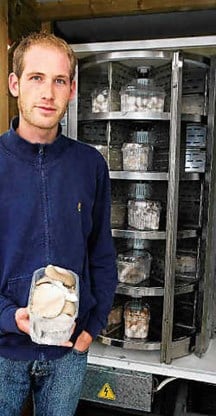
I’ve been way for too long ! I only knew of Baguette and pizza vending machines. Things are evolving so fast. Today it’s potato and mushrooms, tomorrow it will be seeds to grow in your own garden !
My boss once said that you can abuse human workers, you can underpay them, you can worsen their conditions (and if you do it slowly) they might not notice, or they going to work even harder to survive. Worst case scenario they quit, and you just find another one “new” and repeat the cycle.
But you can’t underpay robots. You can’t abuse them. Why? Because they just break. You skip on maintenance, on working conditions, on anything around robots - and you are looking on fat sum of money that just going to get burnt on a new robot and its installation.
So no, robots are not going to save money, especially in this scenario, because abuse would be massive.
Except robots don’t need to take as many breaks nor do you have to pay them minimum wage.
You do actually have to pay them more than minimum wage, if you think about it.
Minimum wage in many countries is so low it’s not enough to sustain a human. You can’t do it to a robot, since it will just not do its job, no matter how many regulators you capture or how many middle management manipulations you pull. You have to pay a living wage to a robot.
This is why “people are still cheaper than robots”. What happens if there’s a 20% wave of inflation? With workers, it’s “we don’t give out 20% pay raises, grow up”, with robots, it’s “here is your power bill, it’s 30% higher to cover for any further fluctuations in inflation, pay it or shut your factory down”.
Robots need breaks too, if they are not regularly maintained they will start to make mistakes, costly mistakes, and they might break, and when one breaks, you don’t just recruit one more wage slave from the fucked up job market, you shell out a lot of money for a new robot.
There may be cases where the price of labor is lower than the price of a specific machine, but the Industrial Revolution was built on replacing labor with capital.
It isn’t evenly spread out, but it is something increasingly happening to more and more jobs.
Obviously, automation is changing work, and you can make cheaper robots that will be cheaper than working someone to do the same thing. All I’m saying is there is a significant component next to the direct “pay vs. machine maintenance costs” question.
My point is that companies and employers have got used to a ton of leeway with workers, where they can offload a ton of risk to people just because they are employees.
See for example that one case when that US airline wanted to weasel out of honouring a deal offered by their chatbot. That’s them realizing they can no longer just say it’s been a mistake made by an employee, as there is no separate legal entity to push responsibility on.
The same with paying a wage lower than living wage. If they pay sub-living wages, then the onus to make up the rest needed to lead a life that enables you to work long term, thus the risk is on you instead of the employer. If they replace you with a robot, and skimp on its requirements, it will break, and there is nowhere to push the responsibility.
I don’t see how the use or nonuse AI affects the adoption of a vending machine or self checkout.
Take the case of self-checkouts.
Money is missing from the tally at the end of the day.
In one case, you have an employee as cashier. You can reprimand them, in some jurisdictions even take it from their pay.
What do you do with a machine if money is missing? It may be a tricky customer/thief, it may be just that the machine is not always 100% accurate in certain circumstances, maybe you skimped out on maintenance one too many times. Who do you blame?
That’s why there are no vending machines for certain types of goods, or no self-checkouts at car dealerships or “bad neighbourhoods”. Sometimes the risk component is too high.
What do you do with a machine if money is missing? It may be a tricky customer/thief, it may be just that the machine is not always 100% accurate in certain circumstances, maybe you skimped out on maintenance one too many times. Who do you blame?
Having dealt with automation in a specific context, the people making these decisions aren’t focusing on blame. Instead, there is an assumed increase in shrinkage which gets factored into the cost-benefit analysis on whether to choose automation. The conditions in which shrinkage can happen affects the risk shrinkage.
No one is looking at who to blame if an electronics store goes for self checkout, they are looking to see at how much easier it will be for people to steal from that store compared to if all cashiers are human.
The problem is minimum wage is the break even equivalent of like 2-10k human hours without even factoring in expensive maintenance costs.
A return on investment of 0.5 to 2.5 years is pretty good for companies. You also have to factor the costs of maintaining a space for a human equivalent. Paying a wage doesn’t cover all labor costs.
I mean, maintenance is going to be a bitch. Your going to have to pay thousands in travel fees and probably thousands of dollars an hour labor, plus whatever robit parts cost everytime it breaks down. And while it’s broken down, you can’t earn revenue, like you could just replacing an employee.
You have to pay them minimum wage, It’s just called “monthly maintenance expenses” and it’s quite a bit more than minimum pay for humans
and it’s quite a bit more than minimum pay for humans
Is it? I can buy a vending machine for less than $8000. Converting that cost to minimum wage, that is ~28 full time weeks worth of labor to act as a mechanism to sell items. There are probably a lot of times when the cost in capital is less than the cost in labor.
We used to. They were called Vendo-mats. They had sandwiches and cakes and all kinds of things. They weren’t exactly vending machines in the sense that things would fall down. The food was behind a little door you’d open after paying. I’m too young to remember what the stuff tasted like, but it seemed pretty good because the food would always have to be put in the machines fresh every day.
as an elder millennial, I can say they were not that great. I enjoyed the novelty though.
The Horn and Hardart automat was an interesting bit of early 20th century Americana.
https://upload.wikimedia.org/wikipedia/commons/c/ce/Horn_%26_Hardart_automat.JPG
Just like the cake machines in the TVA break rooms!
Oh, we had something like this in college. The vendor would load up the… well, actually, it was more like a big version of those little coolers you see in the checkout line in grocery stores—the ones with the sodas and stuff in them. Anyway, the vendor would load them up every couple days. It’d have sandwiches, salads, puddings (which were actually really popular), sodas, Gatorade, water, and a bunch of other stuff. If we wanted something, we would just get it out, scan the barcode on the scanner attached to the handle, tap our phones or cards to pay, and be on our way.
the food would always have to be put in the machines fresh every day.
ate from these on a few occasions as a kid, and no, they were not fresh every day. I remember my mom sniffing egg salad sandwiches and throwing half the ones they purchased in the trash at a rest stop. also had them at rest stops in the UK in the late 80s as well. it was not great.
LOL. That was an assumption on my part. Eat at your own risk, huh?
definitely culinary roulette - ‘fast food’ ya know?
I’m seeing a lot of advanced retail in US vending machines - inside airports. Food, electronics, cosmetics, all kinds of stuff.
This hints at the problem. Airports have improved security and you have to spend money on a plane ticket to enter so they don’t suffer the same dystopia as public spaces in the US which are trashed and destroyed by any asshole coming through who doesn’t give a shit, including the extremely impoverished and homeless which as a category includes many drugged up people, congenital criminals, and mentally ill. There are some over generalizations here about Americans all having no respect for others and this isn’t fair. Most are wonderful people. But enough Americans suck that it spoils the party for everyone, and broken window syndrome is a thing.
Sidenote: Homelessness_in_Japan is really low because they made some serious efforts to tray and reduce it.
Homelessness in Japan is illegal, so people turn Internet cafe pods into “homes”.
I wonder if they’re including those that are living in internet cafes and such. I remember that being a pretty prevalent problem a bit back. Wikipedia says they counted it on 2007, but no notes of whether they continue to include them or not as homeless.
Not discounting their achievement though, they have their shit together, at least way more than the US
That’s interesting. It sounds like people are paying to be in those facilities, where they can get showers and food in addition to a place to be. Almost like everyone is tacitly okay with the arrangement. This is certainly not housing but neither is it exactly homelessness.
I’ll give that a read. There’s also almost no homelessness in San Francisco Chinatown, despite the rest of the city being an open sore. I’ve never heard the whole story about why but I think it’s a combination of active community development organizations offering low cost housing and cultural differences in how families work, how drugs are regarded, and what is permitted out in the open street.
Chinatown is a more unique environment. Lots of foot traffic, sidewalk vendors, and really tight knit community. Its not a scaleable solution though. Hard to make that kinda of super dense area everywhere
Somehow related. There is a Japanese anime where the protagonist is a human that reborns as a vending machine.
Been watching it. It’s fucking wacky
Uh where can it go from there
It is quite interesting. I don’t think that there is a better adjective than that. It is called ‘Reborn as a Vending Machine, I Now Wander the Dungeon’.
My company has a vending machine for computer accessories. For example, if you need a replacement mouse, just go over to the machine, wave your badge in front of the sensor, select the mouse, and wait for it to drop
deleted by creator
I just loved the beer vending machines. Not as much as I would have as a teenager that looked 20 something but that’s why we can’t have nice things here














